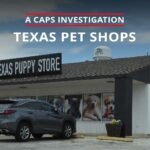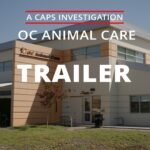

The Companion Animal Protection Society (CAPS) has made great strides in 2015 against the vicious pet shop/puppy mill connection. For a smaller nonprofit, we are continually in awe of the commitment among our board, staff, volunteers, and donors who make tremendous sacrifices in order to help us do more with less.
In fact, one of our valued donors said it best:
“Your work and accomplishments, despite a smaller staff and limited $$$ compared to other groups, makes CAPS by far the best animal charity working on the puppy mill problem.”
2015 Key Efforts and Accomplishments
Building for the Future
CAPS is working on long-term strategic planning that will help us increase our stewardship efforts and build our capacity to accomplish even further reaching goals. We recently launched our monthly donor program – The CAPS Constant Companions. The program is gaining momentum as many of our loyal donors learn the benefits of making automatic recurring donations. In addition, we recently launched our major giving society, The Spencer Ambassadog Society, to recognize people and organizations who have made a generous gift of $1,000 or more in a year. Our website has details on both programs.
The CAPS Pet Shop Campaign Program
CAPS has a highly integrated and effective Pet Shop Campaign Program that includes: pet shop investigations, consumer complaints and assistance, puppy mill investigations, peaceful protests, shelter statistics, humane store conversions (from pet shops selling mill animals to adoption centers offering shelter/rescue animals), ordinances, and consumer education/outreach through media and public service advertising.
Research and Investigations
CAPS is Watchdog for USDA
As you may know, CAPS has long been the watchdog for USDA APHIS Animal Care’s inspection program for thousands of puppy mills and catteries. Our undercover investigations revealed that the USDA was extremely negligent in its enforcement of Animal Welfare Act (AWA) regulations of these inhumane breeders and brokers. The good news is that the number of USDA-licensed dog breeding/brokering facilities dropped from 5,056 in 2009 to 3,009 in 2015!
The bad news is that after some efforts at enforcement, USDA is failing to comply with the 2010 Office of Inspector General (OIG) Report, which came about because of CAPS’ persistent efforts. USDA is emphasizing education (there’s even a program for Amish breeders) rather than enforcement, as mandated by the OIG report. USDA is becoming much more pro-industry in response to our ordinance work by instructing their inspectors to not document minor violations and instead consider them “teachable moments.”
Not all pet shop ordinances can be bans on the retail sale of dogs and cats. For example, New York law only allows municipalities to pass regulatory ordinances, such as the one we successfully worked on and legally defended in New York City. Some municipalities are afraid of getting sued. Regulatory ordinances can mandate the number or severity (direct vs. indirect) of violations of breeders selling to pet shops.
A CAPS review of hundreds of USDA inspection reports showed that most USDA inspectors continue to cite veterinary care violations as Indirect rather than Direct violations, even when the violations are cited as “Repeat.” Direct violations are those that directly impact the health and well-being of dogs and cats. CAPS is trying to obtain congressional oversight hearings and a follow-up meeting with the OIG to address these issues and others.
Puppy Mill Investigations
CAPS is the only nonprofit to investigate inside puppy mills and catteries and document Animal Welfare Act (AWA) violations. CAPS uses evidence from investigation reports, undercover video, and photographs to support ordinance work, protests and other outreach, USDA oversight, media stories, legal cases, and enforcement of local, state, and federal laws.
Because of your support, CAPS has the most effective puppy mill and pet shop investigator in the country. You may know his work best from CAPS’ documentaries about his undercover employment investigations. CAPS continues to use evidence from his six-month employment at The Hunte Corporation (the largest broker in the country) for ordinance work. The investigator’s six-week investigation of notorious dog broker and breeder Kathy Bauck led to her animal cruelty conviction and revocation of USDA license.
Rescue and Rehabilitation
Our investigator rescued a puppy named Teddy from a horrible Iowa puppy mill during one of the more than 50 puppy mill investigations in 2015. Extremely un-socialized with wet, matted fur, Teddy smelled like ammonia, urine, and feces. After cleaning him up, we turned him over to the Animal Rescue League of Iowa (ARL Iowa), and he is now safe in a loving home. Teddy lived in deplorable conditions with a multitude of Animal Welfare Act (AWA) violations, including kennels with feces accumulation on flooring and under cages and serious veterinary care violations (badly injured ear, scraped bloody nose, eyes swollen shut). CAPS works closely with ARL Iowa and Iowa Voters for Companion Animals to report bad dog breeding facilities. Law enforcement failed to see any inhumane conditions. Sadly, this is often the case in the rural Midwest, although we’ve been getting cooperation in Missouri where we work closely with Missouri Alliance for Animal Legislation and the attorney general’s task force.
Education and Outreach
Pet Shop Investigations
California
To support future ordinances, CAPS has investigated and continues to investigate every pet shop selling cats and dogs in Southern California. We are also investigating Southern California breeders who supply smaller pet shops, many of which refuse to provide breeder names (a violation of state law). CAPS is also investigating Midwest breeders and brokers selling to California stores.
CAPS won its Anti-SLAPP (Strategic Lawsuit Against Public Participation) legal motion against David Salinas, the owner of San Diego Puppy, who sued us over the San Diego ordinance. This means that Salinas must cover our attorneys’ fees. You may recall that CAPS was behind the San Diego ordinance. Our Models Against Pet Shops and Puppy Mills billboard, which was right in the parking lot for San Diego Puppy, received extensive media coverage. Salinas is hiding assets but managed to open four more stores, all of which we are investigating extensively.
CAPS investigated and revealed the source of the cute puppies from PuppyParty.com seen on the “Today” show.
For our large, in-depth project with the New York Attorney General’s (AG’s) office, CAPS has investigated and continues to investigate every pet shop (more than 90) in New York City, Suffolk, Nassau, Westchester, and Dutchess Counties and the numerous breeders and brokers that supply them.
From a story that aired on NBC’s “Today” show and an article in The Wall Street Journal, CAPS learned about a growing and disturbing pet shop practice of renting puppies for parties and other social events.At first glance, a puppy party business sounds like an innocuous idea until you ask where they are getting all those purebred dogs. The answer: puppy mills.
CAPS linked the puppy party business to Puppy Paradise, a Brooklyn pet shop – investigated by CAPS – and produced a video exposé entitled “A Puppy Party.” The video deftly counters the seemingly cute and fun party concept with stark video and audio clips from actual puppy mills – investigated by CAPS – that supply Puppy Paradise. In order to warn and educate the public of this disturbing practice, the video was heavily promoted through email marketing, the CAPS website, and social media.
Illinois
CAPS has been investigating three pet shop chains in the Chicago area to obtain breeder and broker names for mill investigations in support of ordinance work.
Education and Outreach
Pet Shop Protests
CAPS has an established protest protocol, which involves civilized, peaceful protesting modeled after the practices of Gandhi, Martin Luther King, Jr., and Cesar Chavez (as a dedicated volunteer, I had the honor of dancing with him). During our protests, we distribute literature and encourage consumers to adopt from a shelter or rescue rather than buy from a pet shop. During most of our protests, no puppy or kitten sales take place. CAPS continues to hold ongoing pet shop protests in the Chicago area at Happiness is Pets and Petland locations.
Ordinances and Legal Work
Illinois
CAPS wrote an amicus curiae (friend of the court) brief on behalf of Cook County, which was sued by Petland, Happiness is Pets, and the Missouri Pet Breeders Association over the county’s ordinance. While we didn’t file our brief, the county used the most critical parts of it in their successful motion to dismiss the lawsuit. Petland, HIP, and MPBA are now appealing the federal court decision.
CAPS drafted an ordinance for Joliet, IL that bans the retail sale of pet shop puppies, kittens, and rabbits. CAPS investigated Petland and Furry Babies in Joliet and provided breeder evidence in support of the ordinance. The ordinance is on hold pending the outcome of the Cook County appeal.
New York
CAPS worked closely with the New York City Council on Ordinance 55, which passed in December 2014 and strictly regulates pet shops in the city. In response to this ordinance and another requiring spaying and neutering of pet shop animals upon sale, the New York Pet Welfare Association (NYPWA), comprised of pet shops, breeders, and brokers, incorporated in New Jersey in January 2015. This pet industry trade organization filed a lawsuit in June 2015 to overturn the city’s pet shop ordinances. Through legal pleadings and other evidence, CAPS identified some of the pet shop members and produced an investigative video, “What is the NYPWA?” that proved these pet shops buy from puppy mills investigated by CAPS. Our amicus curiae brief supported New York City’s motion to dismiss NYPWA’s lawsuit. On October 30, a federal judge dismissed the NYWPA’s lawsuit. The NYPWA is appealing the decision.
Florida
CAPS is responsible for Sarasota County introducing a pet shop ordinance. At the request of the county attorney’s office, our legal team provided an extensive memorandum that proves that federal and state law support a pet shop ordinance. Petland is the only store left in the county. Puppy Town, a store we protested, closed. CAPS President Deborah Howard plans to testify on behalf of the ordinance in January and provide additional evidence on breeders and brokers who sell to that Petland.
Colorado
CAPS has been obtaining interstate health certificates to determine the source of puppies and kittens going to pet shops in Colorado and plans to begin ordinance work in the state in 2016.
Media
CAPS worked with the The Poughkeepsie Journal on a three-part exposé about the two pet shops in Dutchess County: Pet Zone and American Breeders, both of which we have investigated, in addition to many breeders and brokers selling to the two stores. One of the articles featured a CAPS pet shop complainant. Our online pet shop (and Internet) complaint form is for consumers who have purchased sick and dying puppies. We obtain breeder and broker names from these forms and assist consumers with their legal rights.
CAPS worked with the I-Team at WWLP 22News (Springfield, Mass.)on a story about pet shops in Massachusetts. The focus was on The Puppy Place in West Springfield and Elite Puppies in Webster (now closed) and included footage of four Midwest puppy mills recently investigated by CAPS. Elite Puppies was one of three stores that used to obtain puppies from Kathy Bauck.
Without your support, many defenseless animals suffer in silence and are subjected to years of cruelty, neglect, and indifference in puppy and kitten mills while pet shops continue to prey on the wallets and emotions of consumers.
The generous support of foundations and donors helps CAPS make a difference in the lives of companion animals suffering in pet shops and puppy/kitten mills.




